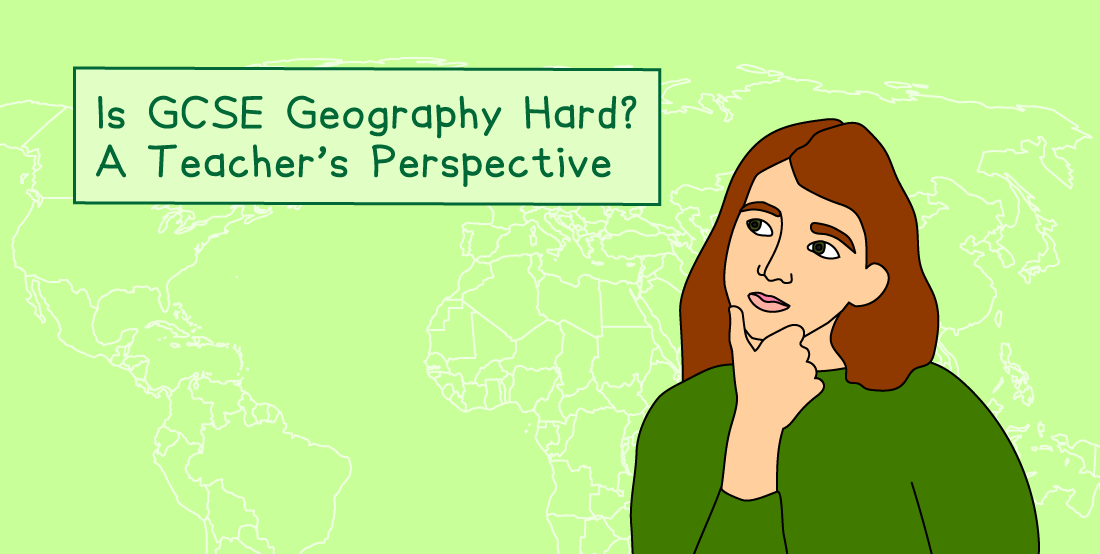Is GCSE Geography Hard?: A Teacher’s Perspective
Written by: Bridgette Barrett
Reviewed by: Alistair Marjot
Published

Contents
As a geography teacher with years of experience guiding students through their GCSEs, I often hear the same question: ‘Is GCSE Geography hard?’ The short answer is, it depends.
Like any subject, GCSE Geography presents challenges, but with the right mindset, strategies, and resources, it can also be an enjoyable and rewarding experience. This article will break down the key difficulties students face, offer insights into overcoming them, and provide reassurance for those considering Geography as an option.
Is GCSE Geography Hard?
GCSE Geography has a reputation for being content-heavy, requiring a range of analytical skills.
However, compared to subjects like GCSE History or the sciences, many students may find Geography easier. This may be due to its real-world applications and visual elements like maps and diagrams.
From my experience, students who engage with the subject, actively participate in discussions and use structured revision techniques tend to succeed.
What Makes GCSE Geography Hard?
While Geography isn’t difficult on the whole, certain aspects can challenge students. Understanding these difficulties can help you better prepare.
1. Extensive Content and Case Studies
The GCSE Geography syllabus covers a broad range of topics. This includes natural hazards like earthquakes and volcanoes to human geography themes like urbanisation and migration.
In addition, students must learn several case studies, remembering specific facts and figures for use in exam answers.
For instance, some of my students have struggled with memorising the case studies on earthquakes and volcanic eruptions. This can be improved by creating simple concept maps to organise information.
2. Exam Technique and Extended Writing
A key difficulty for many students is structuring long answers.
Unlike subjects that rely on multiple-choice or short-response questions, GCSE Geography requires essay-style responses that analyse causes, effects, and solutions.
I always advise my students to practice using the PEEL (Point, Evidence, Explain, Link) technique to structure their answers effectively.
3. Fieldwork and Data Interpretation
Fieldwork is an integral part of GCSE Geography, requiring students to collect, analyse, and present data. While some enjoy this practical aspect, others find it challenging, particularly when interpreting graphs or maps under exam conditions or applying the fieldwork skills they have gained to exam questions.
I always recommend that students practice past paper questions on data analysis to build confidence.
How to Overcome the Challenges of GCSE Geography
There are several key strategies that I recommend to my students to help them achieve the highest grades in GCSE Geography.
1. Use Active Revision Techniques
Passive reading isn’t enough. Instead, try:
Mind maps for organising case study information
Flashcards for key terms and definitions
Teaching others (explain concepts to a friend or family member)
2. Master Exam Techniques
Good exam technique can make all the difference. My top tips include:
Answer in full sentences and avoid one-word responses
Use the PEEL structure to provide well-developed arguments
Practice past papers under timed conditions to build confidence
3. Engage With Fieldwork Practically
If you struggle with fieldwork and data analysis, focus on:
Practicing graph reading and map skills
Revisiting past fieldwork questions to understand common patterns
Taking part in extra field trips if available, to gain hands-on experience
Frequently Asked Questions
How Hard Is It to Get a 9 in GCSE Geography?
Achieving a top grade requires a combination of strong subject knowledge and excellent exam technique. In 2023, 25% of students achieved a grade 7 or above. My highest-achieving students focus on structured revision, practice extended writing, and master their case studies.
Check out our helpful guide for top tips on how to achieve a grade 9 in your GCSEs.
Is GCSE Geography Hard to Pass?
While some students find it challenging, consistent effort and revision strategies can help you pass comfortably. In 2023, 66% of students achieved a grade 4 or above. In my experience, students who regularly complete homework, engage in discussions and seek help when needed tend to achieve at least a Grade 4 or higher.
Is Geography a Good Option for GCSE?
Absolutely! Geography is not only academically rewarding but also highly relevant. It provides you with critical thinking skills, problem-solving abilities, and a broader understanding of global issues. These are all valuable skills for further studies and careers.
Boost Your Confidence With Save My Exams
Feeling stressed ahead of your exams? Join over 1.5 million students who use Save My Exams, the leading online revision platform.
On average, students who use Save My Exams improve by two grades, thanks to our comprehensive resources. From past papers and revision notes to exam-style questions tailored to your specific course, our revision tools help you study smarter, not harder.
Created by teachers and examiners who know exactly what you need to revise to achieve the best grades, our resources help you save time and get straight to the content you need.
Explore Our GCSE Geography Revision Resources
References
Sign up for articles sent directly to your inbox
Receive news, articles and guides directly from our team of experts.

Share this article


 written revision resources that improve your
written revision resources that improve your